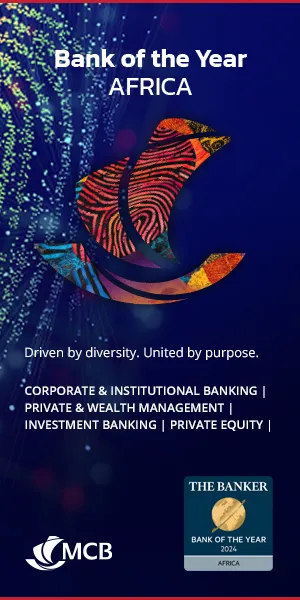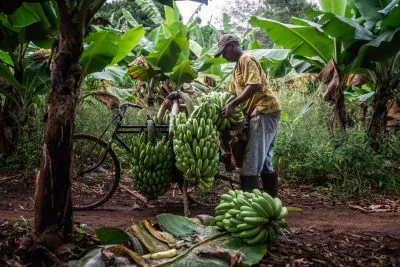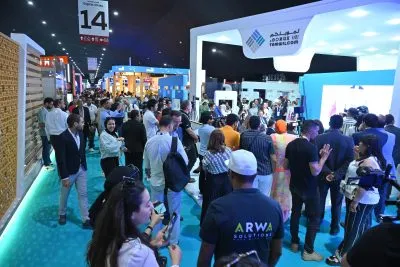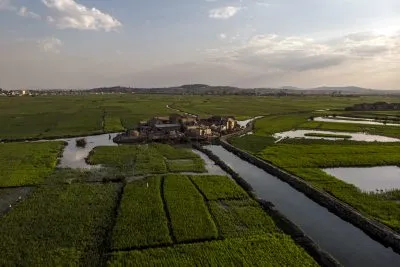There was a saying in India in the 1990s along the lines that half the population didn’t have a phone and the other half didn’t have a dial tone. There was some truth in the maxim but the Indian telecoms sector has changed out of all recognition as a result of the mobile boom. The same mobile technology is changing the face of African communications and far more people now have mobile phones than landlines on the continent.
Mobile telephony is changing the fundamental structure of African economies as much as it is changing the social and economic lives of millions of Africans. There are many factors behind stronger and more balanced economic growth on the continent over the first two decades of the new millennium but there is broad recognition that increased access to mobile phones is one of the most important factors.
It is also generally agreed that the next big leap forward will take place when smartphones are owned by the bulk of the population and data becomes more affordable. Mobile phone penetration rates have rocketed in Africa over the past few years.
According to industry body GSMA, the number of SIM connections on the continent is set to increase from 747m at the end of 2017 to 1bn by 2025. However, as some people have more than one SIM, perhaps to separate work from personal life, or one business activity from another, penetration rates are not as high as this figure suggests. GSMA puts the number of unique users at 477m.
Smartphone penetration rates are lower but still climbing: from 15% of the continent’s population in 2014 to about 35-40% at present, although this figure varies widely from country to country. Total online penetration rates are increasing too but differ massively across the continent, from 4.7% in Western Sahara to 87.2% in Kenya.
The level of technology and services available on price performance smartphones has increased sharply even over the past two years. New innovations, such as longer lasting batteries, AI power management and power saving modes have become standard on many models. Such features are invaluable in parts of Africa where access to electricity is still limited and often unpredictable.
The way people use mobile phones is changing around the world and in all industries. They have become the conduit for the digital transformation that is taking place across Africa and in other emerging market areas.
Phones are fundamentally changing the way business is conducted, trade is transacted and assets are managed. At the same time, they are revolutionising other aspects of life: they are the means by which health is monitored and everyday life is conducted, including social interaction and networking.
Leading the charge
As much as Samsung and Apple may dominate the international headlines, such brands have made relatively little headway in Africa. The real competition on the continent is taking place in the middle range smart phone and budget phone brackets. Leading the charge is Transsion, a Chinese led group that actually started in Africa and focuses on emerging markets outside of China.
Founded in 2006, its brand TECNO is the single biggest smartphone seller on the continent and has firmly established itself as a household name. This leading position allows the company to target every African market without discriminating or needing to restrict its geographical focus, relying on the quality of its products and the features it can offer. Shipments of its smartphones grew by 32% year-on-year in the second quarter of 2020, even at the height of the global Covid-19 pandemic.
Stephen Ha, Vice-President of Transsion Holdings and General Manager of Tecno Mobile, attributes their success to designing phones specifically for the needs of African consumers.
From its first day of business, TECNO made a strategic decision to focus exclusively on Africa. It is now taking its African experience and know-how to other parts of the world, expanding into other fast growing emerging markets in the Middle East, South East Asia and Latin America, with significant breakthroughs in India, Pakistan, Thailand, Colombia and Ukraine.
Yet despite its aim of becoming an international company, TECNO intends to make sure Africa remains its core business and central to its strategy.
The hardware producer leads both the low and middle range sectors of the African mobile phone market, and over the next year it will explore the middle-high end markets with more competitive products. The cost to performance ratio is a significant factor for all mobile brands but TECNO’s focus is on the total user experience and its research and development (R&D) is focused on continuously upgrading and innovating users’ experiences.
According to Ha, the R&D teams, alongside their researchers and management focused on developing solutions adapted to the African consumer and to overcome the constraints that they faced.
For example it developed technology that provides 72 hour battery life and up to six days in standby mode. Solar kiosks and the growing use of low cost residential solar kits are improving the situation but a longer battery life is crucial for many African consumers. Another feature has been the development of enhanced camera phones that are optimised for darker skin tones.
Rapid growth
Research by advisory firm Gartner found that international sales of smartphones to end users are set to reach 1.57bn units worldwide in 2020, a rise of 3% on the previous year, despite the impact of the pandemic on the global economy. More than 90m units will be sold in 2020 in sub-Saharan Africa alone and sales are expected to continue to grow with a further 93m handsets forecast to be sold in 2021, according to the same report.
Ha tells African Business: “As a company and brand that has been dedicated to the continent, these trends do not surprise us and it is in line with our expectations. We’ve seen the market grow and it’s about serving a need: smartphones are a product which people desire but also need. But it’s more than that, and I can modestly say that our success has been about providing innovations that are in line with the needs of the continent.”
TECNO was the first brand to launch phones with dual SIM cards in Africa over a decade ago, while it also quickly pioneered enhanced camera solutions for Africans and the African market.
Rather than merely seeking to market models that have been successful elsewhere in the world in Africa, the company is continually driving the market’s evolution by studying and understanding end user preferences that it can incorporate in its newest models. Africa is not a single market, nor even a continent comprising different national markets but a far more complex arrangement of different market segments, within which consumers have different product expectations and needs.
Perhaps the biggest trend in the African mobile boom in the past has been in connecting Africans with each other as well as the rest of the world but the increased uptake of smartphones is changing that. The focus is now more on providing greater lifestyle options and, to coin a term used by TECNO, “connecting to a more achieved life”.
Ha explains that this is the result of both demand and supply side factors: it is what consumers want but innovation by developers and operators is creating products and services that actually create demand. Economic growth and the emergence of ever bigger middle classes help create this demand for better and more sophisticated handsets through repeated upgrades.
Access to data is often difficult and expensive in rural areas. Is the lack of infrastructure holding them back in terms of their potential growth. Ha says “it’s easy to criticise but when you look at what has been done, the infrastructure development is actually remarkable. We’ve witnessed it first-hand and there have been significant changes and improvement.”
There is no doubt that the world is undergoing a digital revolution that could lead to changes on an unprecedented scale and Africa is on the cusp of radical transformation. Consumers have access to 3G or 4G in most countries, networks are becoming quicker and more people are running their businesses online.
“Sceptics may well point out the inadequacy of Africa’s infrastructure and believe that it is not ready to enter the digital age, but they are mistaken; on the contrary, it is very well placed and at TECNO, we’re happy to support this take off, thanks to technology. We’re very positive about the future and the digital revolution that’s taking place across Africa. Yes, it can do better, but our projections are that Africa can become a global tech hub,” said Ha.
Research and development
The company has invested significantly in R&D in order to achieve its continuous upgrade strategy, giving end users a constantly evolving experience and higher end devices in the process.
“I cannot stress more the importance of investing in R&D. Innovation can’t have a finishing line, it’s a continuous process,” says Ha. The company has two research centres, four manufacturing centres, more than 2,000 service contact points and many large after-sales repair centres spread across the world, giving it both a local and a global perspective.
The firm’s R&D teams have adopted the philosophy of “think global, act local” in both developing new technology and more generally in designing new product specifications. Its R&D strategy is based on marginal improvements that can cumulatively have a big impact.
“Whatever you do, whoever you serve, you need to compete with yourself to continuously get to understand your clients, their behaviour and needs in order to bring them the best possible products”, says Ha. “When we develop our products, we really try and understand how our customers live, what matters to them, what they need, what they aspire to.”
Social media’s importance was identified by TECNO at an early stage, Ha says, particularly the role that it plays in the lives of younger consumers. He explains that this insight drove the development of its Spark series of devices, which allow its younger customers to maximise their social experience and easily create content to share on different social media platforms.
Right now, Ha stresses, their focus is on producing increasingly sophisticated products and offering easier access to smart connection services. “Thanks to this, consumers are provided with tremendous opportunities and are truly being empowered by smart connections and smart devices. It’s easy to say but we are lifting people out of the digital gap thanks to developments in technology and mobile infrastructure,” notes Ha.
Upgrades in telecommunications infrastructure, from 2G to 3G to 4G, and now on to 5G is supporting the entire process. The rapid evolution of 4G and even 5G in many countries has allowed the company to expand its range of product offerings that are packaged in stylish smart devices, ranging from Bluetooth-enabled products, such as headphones and speakers, to smart home electronics and wearables.
Different functions
Smartphones will play an increasingly important role in our lives, says Ha: “They’re an executive assistant, a friend, a helper, a business and much more. We design them not with a particular person in mind but rather to perform across a wide range of consumer scenarios. Whether you’re an entrepreneur working on building your business or a student with the next billion dollar idea or a professional gaming KOL [Key Opinion Leader, or influencer] or a camera-savvy user, we have a device specifically crafted to meet your needs.”
This has been achieved by making the range of models as diverse as end users.
The rapid growth of 4G and 5G services in Africa is enabling new services and connections powered by data interactions. Ha strongly believes that this is where the company will see considerable growth. In response, TECNO is introducing technologies and innovations in artificial intelligence (AI), the internet of things (IoT) and big data. For instance, in September it launched its Smart Artificial Intelligence of Things (AIoT) ecosystem strategy. AIoT is the convergence of AI and the IoT.
Ha says that it is “a forward-looking ‘1+N’ strategy with a customer-oriented obsession, wherein ‘1’ means that customers shall be taken as the core; ‘N’ means N types of living scenarios the customers will experience.”
The scenarios include home interconnection, commerce, education, travel, sport, leisure, entertainment and many more strands in the current and future lives of customers.
“With this strategic AIoT ecosystem launched, we are committed to bringing customers the most desirable AIoT products and smart connection solutions with the best quality at a competitive price”, says Ha.
Ensuring security
The global debate over trust and ownership of data has become an increasingly important issue for hardware and software producers. Concern over data use has hit the headlines over Huawei and TikTok’s operations in the US and in India, where Facebook and other service providers have had to provide the government with certain reassurances.
Ha says that security is paramount to the group and a dedicated team is today ensuring their phones today are more secure than ever, as well as working with other software providers such as Google to safeguard their phones from malware.
“We are fully equipped with strong manpower, tools and technology to ensure efficient close monitoring, timely feedback, rapid upgrades and systematic deployment to be carried out through the whole process, which covers all aspects of code audit, security penetration, loophole mining, emergency responses, system training and overall construction,” he says.
If anything TECNO’s phenomenal growth and journey in Africa highlights both the possibilities within Africa and the fact that businesses will need to have a digital and mobile at the centre of their strategy.
Read more from our special report on African telecoms.
Want to continue reading? Subscribe today.
You've read all your free articles for this month! Subscribe now to enjoy full access to our content.
Digital Monthly
£8.00 / month
Receive full unlimited access to our articles, opinions, podcasts and more.
Digital Yearly
£70.00 / year
Our best value offer - save £26 and gain access to all of our digital content for an entire year!

 Sign in with Google
Sign in with Google 






